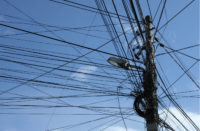The effects of Wirecard’s collapse are now rippling around the world, depriving millions of workers in the global freelance economy from access to their money.
Many of those without formal employment contracts, often people on low earnings, use pre-paid payment cards or digital wallets to receive and store earnings from the people they work for.
Without warning, payment cards have stopped working
But following this week’s collapse of German payments company Wirecard, without warning some of those payment cards and digital wallets have stopped working.
The suspension of the card payments systems came as a result of a decision yesterday by the UK’s financial regulator, the Financial Conduct Authority (FCA), acted to freeze the accounts of a UK-based Wirecard subsidiary.
The FCA said it was taking this action because of a need to prevent cash being funnelled by the UK subsidiary, Wirecard Card Solutions, back to the now insolvent German parent company.
“Our primary objective is to protect the interests and money of consumers who use Wirecard,” the FCA said.
“Following last week’s news of €1.9 billion missing from the accounts of the German company, Wirecard, we immediately placed requirements on the firm’s UK business so that it should not pay out or reduce any money it holds for its customers except on their instructions.”
However, many pre-paid payment cards or wallets used around the world by freelancers—run by global companies such as Payoneer, Crypto.com, Anna Money, Curve, FairFX, Pockit—relied on the Newcastle-based Wirecard subsidiary to operate.
Clients of Payoneer, one of the affected payment card companies, have taken to social media today to express their frustration at losing access to their money.
“I lost my family savings with #payoneer and #wirecard. This is fucking hell. What’s your responsibility for this, Payoneer?”, a Ukrainian client of the firm said on Twitter.
“Many of us freelancers in Africa who use Payoneer to receive payment have our money trapped too due to this issue. I don’t even understand the fallout, but I want my $$ released to me,” another client said.
In a recent YouTube interview, Payoneer CEO Scott Galit described his firm’s business as “democratising access to financial services for the smallest business of the most emerging market to the biggest digital business in the most developed market.”
Payoneer also works with companies like Shutterstock and AirBnB to process payouts to the people renting out services and properties.
According to Galit, Payoneer has millions of clients in more than 200 countries.
In a June 26 blog, Payoneer acknowledged that clients’ funds were frozen but said the situation is temporary.
“Pending further actions from the FCA, you will temporarily be unable to withdraw the funds on your card, nor receive new payments onto your card,” Payoneer said.
“We believe that cardholder funds are properly safeguarded and that the freeze will be temporary,” the firm said.
One industry expert, however, said clients may face a long wait for access to their money.
“Moving payment processor [the capacity in which Wirecard worked for the affected card firms] is a major undertaking,” David Parker, a payments commentator, said on LinkedIn.
Parker is an advisor to Curve, one of the affected companies.
Alex Letts, an entrepreneur, said the impact of Wirecard may be much more dramatic than many expect.
“I think that the FCA action has jeopardised far more than some payment accounts. It threatens to contaminate the whole industry, safe brands and non wirecard companies. The fintech party in banking is now in real trouble,” he said.
The UK’s financial technology sector has raised more than $5bn in investment so far this year, despite the impact of coronavirus and more than other European countries combined.
Sign up here for our monthly newsletter
Click here for a full list of episodes of the New Money Review podcast: the future of money in 30 minutes









